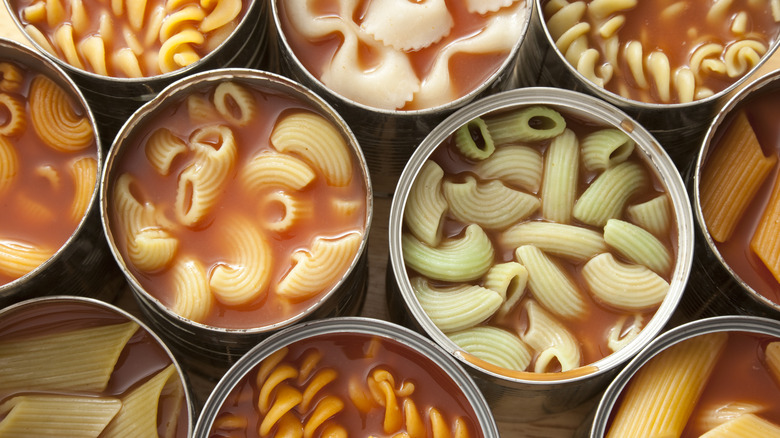This Popular Canned Food Has An Unexpected Effect On Your Blood Sugar
Canned noodles can feel like godsends on those days when you can't remember if the shirt you have on was freshly laundered and you just spilled a glass of milk while in the middle of an attempt to multitask.
How bad can it be? It's got all the essential ingredients right? Not necessarily, say the experts. While some varieties might have the added benefit of micronutrients like iron, manganese, folate, and B vitamins, they are also largely lacking in other essentials like protein and fiber.
Of particular concern is how canned pasta might influence your blood sugar levels. Spiking sugar levels is not something we would directly associate with something like canned noodles, unlike the effect maple syrup has on your blood sugar. However, not being able to control exactly how the noodles are prepped and packaged can change things. Canned noodles are often overcooked, which means they're mushy, easily digestible, and therefore, higher on the glycemic index (GI). They're typically classified mid-to-high GI-wise. Because of this, these convenient foods have a tendency to raise your blood sugar levels upon consumption, at least when compared with the noodles you prepare at home which you have the control to make al dente or even swap out with the wholegrain variety.
The added sugars in canned noodles are also a concern
Some canned pre-cooked pasta can contain as much as 11 grams of sugar. To put that in perspective, the American Heart Association (AHA) recommendation for daily dietary intake of added sugars is 25 grams for adult women and 36 grams for adult men. If 11 grams comes from just one jar of noodles, how much more might you be consuming if you have 2-3 cans of the stuff daily, plus other added sugars you can't account for?
This can't be good for your blood sugar levels either. Added sugars are refined carbohydrates, which means they get absorbed into your bloodstream a lot quicker, causing blood sugar spikes.
If this isn't a deterrent, consider the fact that canned noodles are often associated with poor diet quality. Because they're low in essential nutrients like protein and fiber, and higher in ingredients like added sugars and sodium, they have also been linked to conditions like metabolic syndrome.
Additionally, another danger with canned goods is their sodium level. Since you're not the one in control of the salt being added to the noodles, you could end up consuming anywhere between 460-2,290 milligrams in one sitting. With the recommended limit in the U.S. being 2,300 milligrams of sodium a day, we'll let you do the math. Just like there are certain side effects of low sodium levels, there are also health concerns related to consuming more than your recommended intake of salt in a day.
How to consume noodles without spiking blood sugar levels
Experts recommend limiting the consumption of canned noodles, where blood sugar is concerned. Even if you're spending a few extra minutes in the kitchen cooking up wholegrain pasta, you can avoid unhealthy levels of sugar, salt, and other ingredients and also add in extra protein and fiber.
If you still want to go with the canned stuff, look for wholegrain varieties (if you can find any), and read the labels for sugar content. Combine the stuff with healthier proteins, fibers, and healthy fats, to round out your meal. Aiming to get the nutrients your body needs with every meal is a good way to look at your diet.
Noodles aside, for people watching their blood sugar levels, there are a few non-perishable canned foods that can be safely enjoyed — like chickpeas, tomatoes, salmon, spinach, or chicken. Again, however, read the labels for sugar content.
Also keep an eye out for the signs that your blood sugar is dangerously high — like frequent peeing, excessive thirst, headaches, and blurred vision. Diet has a big impact on your blood glucose levels.



